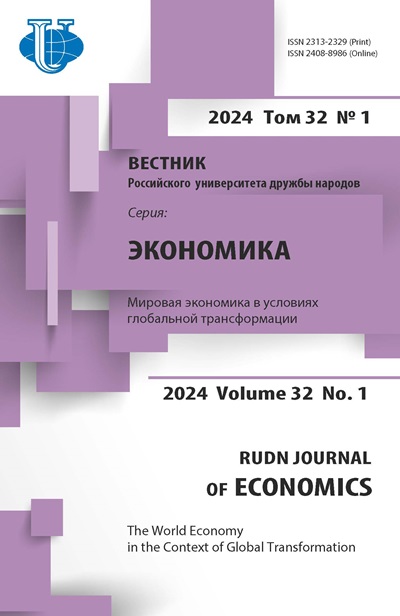“PSEUDO INNOVATIONS” AND “PSEUDO INVESTMENTS” IN RUSSIAN ECONOMY
- Authors: Diesperova NA1
-
Affiliations:
- Russian People’s Friendship University
- Issue: Vol 25, No 1 (2017)
- Pages: 41-53
- Section: Articles
- URL: https://journals.rudn.ru/economics/article/view/17171
- DOI: https://doi.org/10.22363/2313-2329-2017-25-1-41-53
Cite item
Full Text
Abstract
The article investigates the influence of one of the informal institutions braking innovation process in Russia - the so-called “administrative economy”. It is shown its role as a strong incentive to concentrate the activity of subjects of the innovation process on their own goals by reducing the efficiency of the overall process. The braking mechanism based on the transformation of investments in innovation sphere into pseudo investments, which can be used for generation unnecessary for real industry pseudo-innovations is examined. It is shown how the interaction pseudo-investments and pseudo-innovations leads to filling technoparks mainly non innovative enterprises of «past days». It is proved the identity of the objectives of the managing company and residents - to promote models of priority non-innovative residents to innovative residents because of the evaluation of the technopark’s activity on the basis of the value of revenue of resident companies. It is shown the necessity of introducing of restrictions on the granting of resident status, because it makes the companies more competitive in comparison with non-residents due to preferences of the technopark. As restrictions is proposed to introduce a requirement for residents to have intellectual property.
About the authors
N A Diesperova
Russian People’s Friendship University
Author for correspondence.
Email: diesperova_natal@mail.ru
Candidate of sciences (Economics), Associate Professor of the Department of Applied Economics of the Institute of Space Technologies at Russian People’s Friendship University
Miklukho-Maklaya str., 6, Moscow, Russia, 117198References
- Anchishkina O.V. Administrativnaya Economika. Ekspert. 2004. 31 (431). 9—10. (In Russ).
- Bareev T.F. Suschnost i granitsy ispolzovaniya ponyatiya «innovatsiya». Economic Sciences. 2012. 8. 62—64. (In Russ).
- Blohina T.K., Bykova O.I. & Ermolaeva T.K. Ekonomika i upravlenie innovatsionnoy organozatsiey. M.: Prospekt, 2015. (In Russ).
- Volkovitskaya K.G. Modeli funktsionirovaniya tekhnoparkov Moskvy. Materialy nauchno-prakticheskogo ceminara Instituta menedzhmenta NIU VSHE iz tsikla «Innovatsionnaya sreda»; 2016 April 04; 2016. Moscow. Retrieved from: https://www.hse.ru/data/2016/05/30/1132111309/Презента-ция%20К.Волконицкой.pdf (In Russ).
- Doverie mezhdu innovatsionnoy ploschadkoy i rezidentami — nash vazhneyshiy resurs. Intervyu Generalnogo direktora tekhnoparka «Slava» Viktora Sckredova (2015). Investitsionny portal goroda Moskvy; 2015 August 26; Moscow. Retrieved from: http://www.technopark-slava.ru/publication/1949/ (In Russ).
- Zhdanova L.A. The state support of small innovative business in Russia. Bulletin of People’s Friendship University of Russia. Series: Economics. 2005. 1(11). 94—103. (In Russ).
- Ivanova N. Innovatsionnaya politika: teoriya i praktika. World Economy and International Relations. 2016. 60(1). 5—16. (In Russ).
- Intervyu Analiticheskogo agentstva RWAY s Temnikovoy K.N., direktorom po razvitiyu OJSC «Technopark Slava» 2015 June 23. Retrieved from: http://www.technopark-slava.ru/publication/1915/ (In Russ).
- Malkina M.Y. Institutsionalnye lovushki of innovatsionnogo razvitiya rossiiskoy economiki. Journal of Institutional Studies. 2011. 3(1). 50—51. (In Russ).
- Indikatory innovatsionnoy deyatelnosti. Statistical Reference Book 2016. Moskow. Natsionalny issledovatelskiy universitet «Vysschaya schkola ekonomiki». 2016. 472 p. Retrieved from: http://www.hse.ru/primarydata/ii2016 (In Russ).]
- Resolution of the Government of the Russian Federation № 1605 of 30 December 2004. (2004). Retrieved from: http://base.garant.ru/70836848/ (In Russ).
- The Strategy of Innovative Development of the Russian Federation until 2020 «Innovative Russia 2020», (2010). Ministry of Economic Development of Russia Federation. Retrieved from: http://www.innovus.biz/media/uploads/resources/Innovative-Russia-2020.pdf (In Russ).
- Suharev O. Problema psevdoinvestitsiy: metody razrusheniy rossiiskih vysokotekhnologishnyh otrasley. Investitsii v Rossii. 2005. 3. 30—37. (In Russ).
- Temnikova K.N. Proryvnye tekhnologii innovatsionnykh predpriyatiy TP «Slava». Inzhener i promyschlennik. 2013. 6(6), 37—41. (In Russ).
- Tehnopark Slava. (n.d.). Informational and analytical portal. Retrieved from: http://www.technopark-slava.ru/residents/residents_info/ (In Russ).
- Tehnopark Mordovia. (n.d.). Informational and analytical portal. Retrieved from: http://www.technopark-mordovia.ru/resident/ (In Russ).
- Tehnoparki Rossii. Informational and analytical portal. Retrieved from: http://www.tadviser.ru/index.php/Статья:Технопарки (In Russ).
- Fonotof A.G. Rossiya: innovatsii i razvitie. Moscow: Binom. Laboratoriya znanii, 2010. (In Russ).















